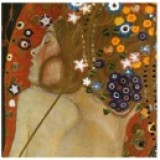Life of a Poet #3 - Richard Wilbur
-
Italian Stallion
15 years agoOkay you all know the drill, this weeks poet is Richard Wilbur.
A little about Richard...he was a Consultant in Poetry to the Library of Congress in the years 1987-1988 ...this means that he was the nation's official poet for those years.
`````````````````````````
Love calls us to the things of this world
By: Richard Wilbur
The eyes open to a cry of pulleys,
And spirited from sleep, the astounded soul
Hangs for a moment bodiless and simple
As false dawn.
Outside the open window
The morning air is all awash with angels.
Some are in bed-sheets, some are in blouses,
Some are in smocks: but truly there they are.
Now they are rising together in calm swells
Of halcyon feeling, filling whatever they wear
With the deep joy of their impersonal breathing;
Now they are flying in place, conveying
The terrible speed of their omnipresence, moving
And staying like white water; and now of a sudden
They swoon down into so rapt a quiet
That nobody seems to be there.
The soul shrinks
From all that is about to remember,
From the punctual rape of every blessed day,
And cries,
"Oh, let there be nothing on earth but laundry,
Nothing but rosy hands in the rising steam
And clear dances done in the sight of heaven."
Yet, as the sun acknowledges
With a warm look the world's hunks and colors,
The soul descends once more in bitter love
To accept the waking body, saying now
In a changed voice as the man yawns and rises,
"Bring them down from their ruddy gallows;
Let there be clean linen for the backs of thieves;
Let lovers go fresh and sweet to be undone,
And the heaviest nuns walk in a pure floating
Of dark habits,
keeping their difficult balance."
`````````````````````````
The immediate impression is that of the tone, the mock-seriousness or mock-astonishment conveyed by the high impersonality of the language, the fastidious eloquence accorded a low subject, the idealistic impulse that takes laundry for angels. This is one of Wilbur's few un-rhymed poems, but one in which the line movement is most sympathetically varied in accordance with the spontaneous yet orderly progress of the observations and reflections. Humor is everywhere in the diction: "spirited" means "carried away mysteriously or secretly"; but this time the agents are actually spirits, the angels in the laundry; "awash," itself a pun, is followed by the "calm swells" of line 9 and by the "white water" of line 14.
"Punctual rape": it is the alarm clock going off, violating one's delightful daydreams.
Though man desires and needs the world of spirit, he must yet descend to the body and accept it in "bitter love" (another appropriate contradictory expression) because this is the world in which man has to live.
The spirit's progress in this poem is like that in "A World Without Objects . . ."; it moves away from the pure vision and back to the impure, "absurd," or contradictory world in which "clean linen" is not for angels but for "the backs of thieves" and for lovers about to be "undone"; in which nuns, who may incongruously be heavy, must keep not only their feet but also the "difficult balance" at the heart of this poem, the balance of the spirit between the two worlds of angels and men.
The poem's two part structure clearly indicates the overall contrast intended between the desire for the spiritual and the necessity for the acceptance of the actual, but the use of intricately chosen diction gives concrete form and definition to the contrast. The diction is, in fact, so refined and precise that the reader perceives the texture of the two worlds of the poem. -
Ingrid
15 years agoBoy at the Window
Seeing the snowman standing all alone
In dusk and cold is more than he can bear.
The small boy weeps to hear the wind prepare
A night of gnashings and enormous moan.
His tearful sight can hardly reach to where
The pale-faced figure with bitumen eyes
Returns him such a God-forsaken stare
As outcast Adam gave to paradise.
The man of snow is, nonetheless, content,
Having no wish to go inside and die.
Still, he is moved to see the youngster cry.
Though frozen water is his element,
He melts enough to drop from one soft eye
A trickle of the purest rain, a tear
For the child at the bright pane surrounded by
Such warmth, such light, such love, and so much fear.
^^^^
I came across this poem as I looked this writer up, that I had never heard of.
The images are so vivid in this piece, you can clearly see the author loves children and is still able to see the world through their eyes.
The snowman was given a human touch and because of that, this had magic, the poem read like a fairy tale.


